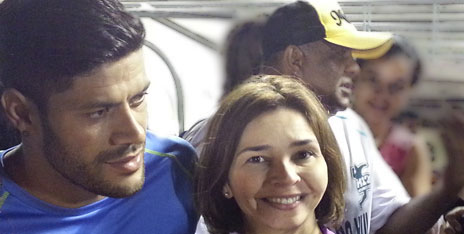
February 15, 2016, by ICCSR
How ICCSR is forging links with Brazilian footballer Hulk
Superstar Brazilian footballer Hulk’s Football School is helping two ICCSR staff to study the idea of ‘productive entrepreneurship’, by which business activity can lead both to competitive advantage for an organization and to societal gain.
ICCSR director Jeremy Hall and Associate Professor in Sustainability Stelvia Matos have linked up with the Hulk Football School in Campina Grande, Brazil, whose patron and namesake, Givanildo Vieira de Sousa (AKA Hulk) plays for Brazil and the Russian Champions League contenders Zenith St Petersburg. When Hulk was a child, the current manager of the school, Mano Costa, subsidized his training, and after making it big, Hulk returned to his hometown to help others who, like him, come from poor backgrounds.
Like many soccer schools in Brazil, the Hulk School has a social dimension, and recognizes the challenges faced by those it recruits from poor backgrounds. However, it departs from most models by virtue of its level of sophistication. Hulk and Mano have emphasized the need for the School not only to subsidize kids to help them play, but to provide them with a more rounded education that gives them the life skills and the confidence to handle themselves in high pressure environments – on and off the pitch. Over the years Mano has seen many promising footballers fail to live up to their potential due to, for example, drug abuse and poor discipline. The School also acknowledges that most students will never make it professionally, but at the very least provide them with fundamental social skills to ensure they have a better future. All students must remain in school, eat healthily and stay away from drugs and alcohol.
Another pillar of the approach is that reliability and integrity are becoming an increasingly valuable attribute for footballers. This means not only recognizing the importance of training, teamwork and related technical skills development, but also an awareness of concerns over maintaining fair play, performance enhancing drug abuse, racism and bigotry. Over the years Hulk has overcome many struggles getting recognized, and has been the target of racism, yet he is still able to maintain his focus in a dignified way (for one such example, see this Guardian newspaper article)
One example is the school’s approach to its integration of players with a mental handicap. When one of these players scores, the entire club erupts in joy, and if any other player shows disrespect to such a footballer, he is immediately benched. According to Mano, you need to respect people before you deserve respect yourself.
Jeremy and Stelvia, who have recently returned from Brazil, are impressed that the school is focused on developing football talent for financial gain as well as social inclusion, and as such are exploring whether it is a potentially disruptive scenario that could have applications across the world. ‘We’re trying to see if this model can be useful to clubs elsewhere, including here in the UK, and whether coaches in the big leagues value their business proposition,’ says Jeremy. ‘The school is about identifying football talent, but at a deeper level it’s encouraging good citizenship through discipline and respect. Will clubs see this as the next paradigm in recruiting?’
With most football academies focused almost exclusively on producing good footballers, Jeremy sees Hulk’s initiative as a great example of productive entrepreneurship, potentially leading to a better quality product that changes the way the market works and leads to a net benefit for society.
Jeremy and Stelvia are also helping the Hulk School to produce a mission statement, which is expected to be finalized soon. And by the way, Hulk is playing in the Champions League this week, so stay tuned.
Photo (left to right): Givanildo Vieira de Sousa (Hulk), Stelvia Matos and Mano Costa
No comments yet, fill out a comment to be the first

Leave a Reply